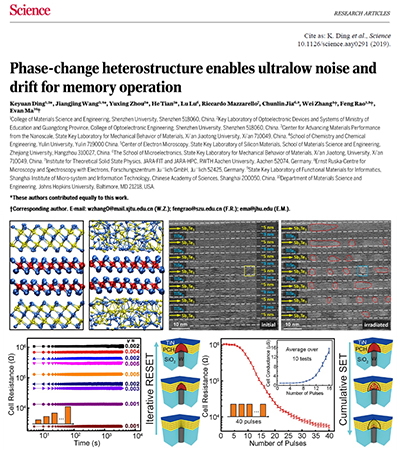Abstract: Artificial intelligence and other data-intensive applications have escalated the demand for data storage and processing. New computing devices, e.g. phase-change random access memory (PCRAM) based neuro-inspired devices, are promising options for breaking the von Neumann barrier by unifying storage with computing in memory cells. However, current PCRAM devices have considerable noise and drift in electrical resistance that erodes the precision and consistency of these devices. We designed a phase-change heterostructure (PCH) consisting of alternately stacked phase-change and confinement nanolayers to suppress the noise and drift, allowing reliable iterative RESET and cumulative SET operations for high-performance neuro-inspired computing. Our PCH architecture is amenable to industrial production as an intrinsic materials solution, without complex manufacturing procedure nor much increased fabrication cost.

The co-first authors of this work include Dr. Keyuan Ding (Shenzhen University), Dr. Jiangjing Wang (Xi’an Jiaotong University), master student Yuxing Zhou (Xi’an Jiaotong University) and Prof. He Tian (Zhejiang University). The corresponding authors are Prof. Wei Zhang (Xi’an Jiaotong University), Prof. Feng Rao (Shenzhen University) and Prof. Evan Ma (Johns Hopkins Universuty). The other co-authors are Dr. Lu Lu (Xi’an Jiaotong University), Prof. Chun-Lin Jia (Xi’an Jiaotong University, Forschungszentrum Jülich GmbH) and Prof. Riccardo Mazzarello (RWTH Aachen). Xi’an Jiaotong University is the first corresponding affiliation.
The work is published as a research article at Science this month. Keyuan Ding, Jiangjing Wang, Yuxing Zhou, He Tian, Lu Lu, Riccardo Mazzarello, Chunlin Jia, Wei Zhang*, Feng Rao*, Evan Ma*. Phase-change heterostructure enables ultralow noise and drift for memory operation. Science. DOI: 10.1126/science.aay0291. The article can be accessed via https://science.sciencemag.org/content/early/2019/08/21/science.aay0291


